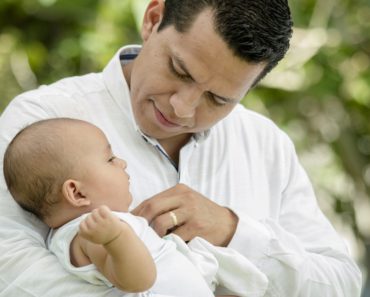Contents
- 1 Insider Insights: 5 Important Things Marriage Therapists Want Stepparents to Know
- 2 The Challenges of Blending Families as a Stepparent
- 3 Nurturing and Strengthening the Relationship with Your Stepchild
- 4 Prioritizing Self-Care in Your Role as a Stepparent
- 4.1 How can stepparents navigate the challenges of blending families in a marriage, according to marriage therapists?
- 4.2 What are some common misconceptions about stepparents that marriage therapists want people to understand?
- 4.3 How can stepparents establish positive relationships with their stepchildren and effectively co-parent with their spouse, as suggested by marriage therapists?
- 4.4 Related Posts

Are you a stepparent navigating the complexities of marriage? In our latest blog post on Stepparent Magazine, we bring you valuable insights from experienced marriage therapists. From communication tips to conflict resolution strategies, discover the expert advice that can help your blended family thrive. Whether you’re a new stepparent or have years of experience, these valuable insights are essential for building a strong and harmonious stepfamily dynamic. Join us as we dive deeper into what marriage therapists want you to know.
Insider Insights: 5 Important Things Marriage Therapists Want Stepparents to Know
Insider Insights: 5 Important Things Marriage Therapists Want Stepparents to Know
As a stepparent, it is crucial to understand the unique dynamics and challenges that come with blending families. Here are five important insights from marriage therapists that can help you navigate your role as a stepparent:
1. Be patient and allow relationships to develop naturally. Building trust and forming a bond takes time, especially when joining an existing family structure. Avoid rushing relationships or forcing connections, as this can lead to resentment and resistance. Instead, let relationships develop organically and be patient with the process.
2. Communication is key. Effective communication is the foundation of any successful relationship, and this holds true for stepparents as well. It’s essential to establish open lines of communication with both your partner and the children. Regularly check in with each family member to ensure their needs are being met and address any concerns or conflicts that may arise.
3. Establish clear boundaries and expectations. In blended families, it is crucial to establish clear boundaries and expectations from the beginning. This includes defining roles, household rules, and discipline strategies. Consistency and fairness are key to creating a harmonious environment for everyone involved.
4. Show empathy and understanding towards the children’s feelings. Children of divorced or separated parents often experience a wide range of emotions, including loss, confusion, and loyalty conflicts. As a stepparent, it is important to acknowledge and validate these feelings, offering support and understanding. Avoid taking things personally and be mindful of the children’s emotional journey.
5. Nurture your own relationship with your partner. Building a strong foundation with your partner is crucial for a successful stepparenting experience. Prioritize quality time together, communicate openly, and seek professional help if needed. A solid partnership will not only enhance your own well-being but also provide a stable and supportive environment for the children.
By keeping these insights in mind, you can navigate the complexities of stepfamily dynamics more effectively and create a nurturing and loving environment for everyone involved. Remember, seeking professional guidance from a marriage therapist can also be beneficial in addressing specific challenges or conflicts that arise along the way.
The Challenges of Blending Families as a Stepparent
Blending families is not an easy task, and being a stepparent comes with its own unique set of challenges. Marriage therapists understand these challenges and want you to know that it’s normal to face difficulties in this role. They acknowledge the complexities of navigating the dynamics between stepchildren, ex-partners, and your own spouse.
It’s essential to recognize that forming a new family unit takes time and patience. Understanding the various emotions and struggles that each family member may experience is crucial. Stepparents often find themselves in situations where they must balance discipline, love, and building trust with their stepchildren.
Marriage therapists emphasize the importance of open communication among all family members. This includes discussing expectations, boundaries, and allowing everyone to share their feelings and concerns. Seeking guidance from a professional therapist can provide helpful strategies for overcoming specific challenges and fostering a healthy blended family environment.
Nurturing and Strengthening the Relationship with Your Stepchild
Building a strong relationship with your stepchild is essential for a harmonious blended family dynamic. Marriage therapists highlight the significance of investing time and effort in nurturing this bond. They suggest focusing on developing trust, establishing common interests, and finding ways to connect on an emotional level.
One important aspect is acknowledging and respecting the stepchild’s loyalty to their biological parent. Show empathy towards their feelings and reinforce that your role as a stepparent does not replace their biological parent but rather supplements their support system.
Marriage therapists also encourage stepparents to be patient and allow the relationship with their stepchild to develop naturally. It’s essential to respect each other’s boundaries while gradually integrating into their lives. Regularly engaging in activities together, actively listening, and demonstrating consistent support can help foster a strong and loving relationship over time.
Prioritizing Self-Care in Your Role as a Stepparent
Taking care of your own well-being as a stepparent is equally important. Marriage therapists emphasize the necessity of prioritizing self-care to maintain a healthy mindset and emotional balance. Recognize that being a stepparent can be emotionally draining at times, and it’s essential to set aside time for yourself to recharge.
Engaging in activities that bring you joy and relaxation, seeking support from friends or support groups, and practicing self-reflection are valuable self-care practices. Remember that when you take care of yourself, you can better support and nurture your blended family.
Marriage therapists also encourage open communication with your spouse about the challenges and stressors you may face as a stepparent. Sharing your feelings and seeking understanding from your partner can strengthen your bond and allow you to navigate the complexities of stepfamily life together.
By recognizing and addressing the challenges, nurturing relationships, and prioritizing self-care, stepparents can create a loving and supportive environment for their blended families.
Navigating the challenges of blending families as a stepparent in a marriage can be daunting, but with the help of marriage therapists, there are strategies that can be employed to ease the process.
1. Communication is key: Open and honest communication between all family members is crucial for building trust and understanding. Marriage therapists often recommend regular family meetings where everyone can express their thoughts, feelings, and concerns.
2. Establish boundaries and expectations: It is important to establish clear boundaries and expectations within the blended family. This includes defining the role of the stepparent, discipline strategies, and rules and routines. Marriage therapists can help guide these discussions and ensure that everyone’s needs are taken into account.
3. Respect each other’s differences: Blending families often means merging different parenting styles, traditions, and cultural backgrounds. Marriage therapists emphasize the importance of respect and acceptance of these differences. It is essential to work together to find common ground and create a harmonious environment for all family members.
4. Foster positive relationships: Building positive relationships between all family members is essential. Marriage therapists may suggest activities or exercises that promote bonding, such as family outings, game nights, or shared hobbies. Creating opportunities for quality time together can help strengthen the family unit.
5. Seek professional help when needed: Stepparents and their spouses may encounter challenges that they cannot resolve on their own. In these instances, seeking the assistance of a marriage therapist can provide valuable guidance and support. Therapists can offer neutral perspectives, teach effective communication techniques, and facilitate productive problem-solving sessions.
Overall, blending families as a stepparent requires patience, understanding, and a willingness to adapt. Marriage therapists can offer invaluable insights and strategies to navigate the challenges and create a loving and cohesive family unit.
What are some common misconceptions about stepparents that marriage therapists want people to understand?
Marriage therapists want people to understand and debunk these common misconceptions about stepparents:
1. Stepparents are evil or wicked: This misconception often stems from fairy tales and societal stereotypes. In reality, most stepparents are caring individuals who want to establish a loving and supportive relationship with their stepchildren.
2. Stepparents should love their stepchildren immediately: Building a strong bond takes time and patience. It is unrealistic to expect an instant and deep connection between a stepparent and stepchild. Developing a healthy relationship requires effort, understanding, and open communication.
3. Stepparents should replace the biological parent: Stepparents should never aim to replace the biological parent. Their role is to provide another source of support and guidance. It is important to respect the child’s relationship with their biological parent while establishing a unique connection of their own.
4. Stepparents are always in conflict with their stepchildren: While blending families can come with its fair share of challenges, not all stepparent-stepchild relationships are filled with constant conflict. Many families find ways to communicate effectively, set boundaries, and develop healthy dynamics.
5. Stepparents are not allowed to discipline their stepchildren: This misconception can lead to confusion and imbalance within the family. Stepparents, with the support and agreement of the biological parent, should be able to set rules and boundaries for the well-being of the household. However, discipline should always be done in a fair and respectful manner.
6. Stepparents only care about their own biological children: It is unfair to assume that stepparents prioritize their biological children over their stepchildren. Many stepparents form strong emotional connections with their stepchildren and genuinely care about their well-being.
By dispelling these misconceptions, marriage therapists hope to foster understanding and empathy within blended families, creating an environment conducive to healthy relationships and effective parenting.
How can stepparents establish positive relationships with their stepchildren and effectively co-parent with their spouse, as suggested by marriage therapists?
Building a positive relationship with stepchildren and effectively co-parenting with a spouse can be challenging but not impossible. Here are some suggestions from marriage therapists:
1. Develop trust and respect: Take the time to get to know your stepchildren and establish a foundation of trust and respect. This can be done by showing genuine interest in their lives, listening to their concerns, and being supportive.
2. Communicate openly: Effective communication is key for successful co-parenting. Make sure all parties involved are clear about expectations, boundaries, and parenting styles. Regular family meetings can be helpful in discussing any issues or concerns.
3. Be patient: Building relationships takes time, so be patient with both yourself and your stepchildren. Recognize that it may take a while for everyone to adjust to the new family dynamic.
4. Encourage bonding activities: Plan activities that allow for quality time and bonding between you and your stepchildren. This could include family outings, game nights, or hobbies that everyone can enjoy together.
5. Respect the biological parent’s role: Remember that you are a stepparent, not a replacement for the biological parent. Respect their role in the child’s life and avoid making negative comments or comparisons.
6. Seek professional help if needed: If difficulties persist, consider seeking the guidance of a marriage therapist or family counselor who specializes in blended families. They can provide personalized strategies and support for navigating the challenges of stepparenting.
Remember, every stepfamily is unique, and it may take time to find what works best for your specific situation. With patience, understanding, and open communication, positive relationships and effective co-parenting can be achieved.
In conclusion, it’s important for stepparents to remember that communication and empathy are key in building successful relationships within the blended family dynamic. As marriage therapists emphasize, seeking professional help when needed can provide valuable guidance and support throughout the journey. Remember, creating a harmonious and loving environment for everyone involved takes time and effort, but with patience and commitment, stepparents can foster strong and meaningful connections with their stepchildren and spouse. Whether you’re navigating the challenges or celebrating the joys of stepparenting, remember that you are not alone, and there are resources available to help you along the way.







